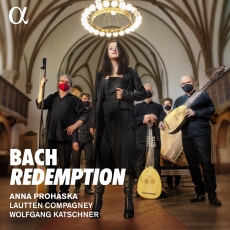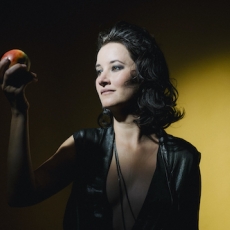Anna Prohaska - Bach: Redemption - Gramophone
This is an album about music and coronavirus. Anna Prohaska, it would seem, had been contemplating a disc of extracts from Bach’s cantatas with Lautten Compagney and Wolfgang Katschner for a while, ideas to which the outbreak of the pandemic gave added urgency. The recording was made under Covid restrictions in June in a Berlin church, the sessions illustrated in the accompanying booklet with shots of distanced performers, sometimes masked, and described, in some of the publicity material, almost as a series of impromptu get-togethers. Using a choir was an impossibility, so choruses are sung by four solo singers, Prohaska taking the soprano line. Chorales are given in instrumental arrangements, we are not told by whom. We’re also not told whether the impact of Covid-19 affected Prohaska’s original intentions with regard to the programme, though what she gives us is very much an album about grief, acceptance and consolation. As with her ‘Paradise Lost’ recital (7/20), we’re very much aware of great intelligence and intellect at work, and the disc’s emotional trajectory relates to the stages of grief, ‘a blend of denial and anger as well as depression and acceptance’, controversially outlined in the work of the Swiss-American psychiatrist Elisabeth Kübler-Ross.
The opening is stark and notably austere, with ‘Bete aber auch dabei’ from Cantata No 115, followed by the chorus ‘Es ist nichts Gesundes an meinem Leibe’, and the chorale ‘Ehr sei ins Himmels Throne’, sombrely played by Lautten Compagney’s brass. Thereafter certainty and doubt alternate in arias suggestive of assertion and reflection. The chromatic unease of ‘Wie zittern und wanken’ comes as a jolt after the florid, almost breezy coloratura of ‘Ich ende behende mein irdisches Leben’.
‘Liebster Gott, erbarme dich’, near the disc’s mid-point, forms the anguished climax, after which the mood becomes increasingly serene, eventually reaching the quiet acceptance of death of ‘Die Seele ruht in Jesu Händen’. A closing ‘bonus track’ returns to ‘Bete aber auch dabei’, now turned into an up-tempo jazz riff, very Jacques Loussier: you might think it belongs on a different album.
Purists may also not care for the way arias and choruses are taken out of context and refashioned into a new emotional narrative, and faced with Prohaska’s juxtaposition of the opening and closing arias of Ich habe genug, I admit to wanting the cantata in its entirety. But the whole disc is done with such affecting sincerity that any qualms are simply swept away. Apart from a couple of phrases taken from below, Prohaska is in beautiful voice, her tone even and silvery, her coloratura accurate and expressive. ‘Ich habe genug’ dances almost joyously, and ‘Weichet nur, betrübte Schatten’ sounds exquisite. That the high tesstitura of ‘Liebster Gott, erbarme dich’ results in the occasional occluded vowel adds to rather than detracts from its intensity. The jazz ‘Bete aber’ is terrific. In the choruses she’s very much a member of an ensemble of equals, and as so often when Bach is done with a single voice to a line, the counterpoint is blindingly clear. Lautten Compagney’s playing has an uncompromising, austere beauty and the string and woodwind obbligatos are simply ravishing. Extraordinarily moving, it really does offer consolation in dark times. Do listen to it.

